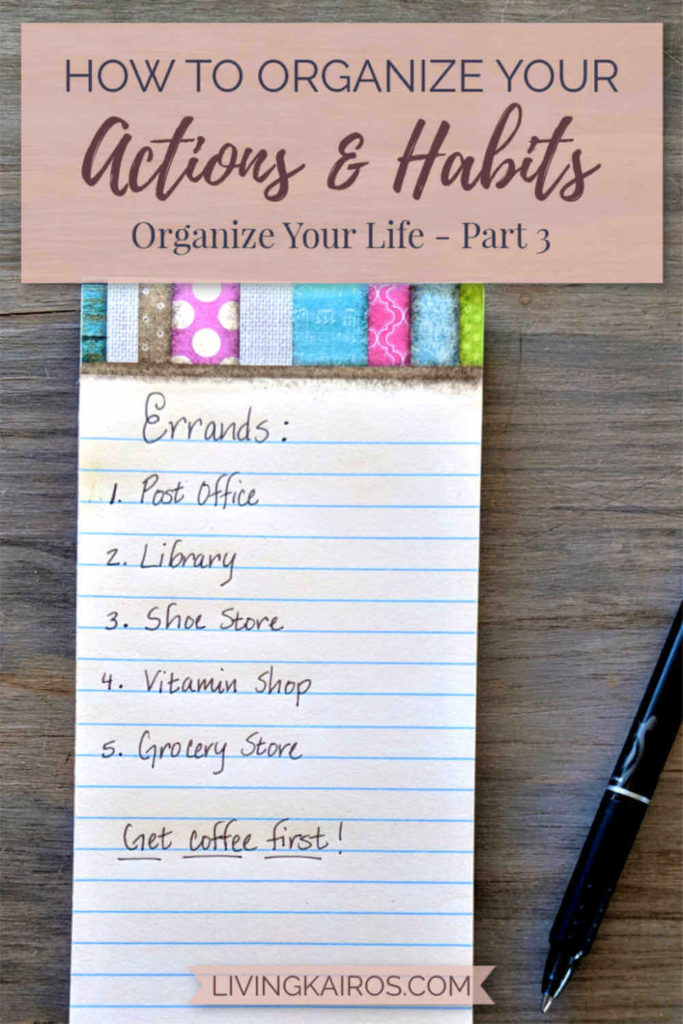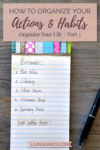Have you ever seen one of those moms who seems to have it all together? Her kids are always dressed nicely with hair combed; she’s got makeup on; she’s always on time or early to every event. First of all, I guarantee that’s not always how things go for her, and second, it doesn’t just magically happen that way. More than likely, that mama has worked her tail off to organize her actions and thus, her habits.
As we continue the series Organize Your Life, we learn how organized actions lead to organized habits. If you missed the rest of the posts in the series, scroll to the bottom of the page for links.

Organize your actions
The previous two steps in the series helped you build a firm foundation by teaching you to organize your thoughts and organize your words. Now get ready to switch gears, because this is where the rubber meets the road. You have to put in some hard work to get that organized life you want. These tips will help you organize your actions, which will, if you continuously practice them, eventually turn into organized habits.
Plan your months, weeks, and days
This is a three-tiered process that begins with organizing your month. At the end of each month, take a few minutes to write in all the time commitments you have (appointments, activities, etc.) for next month in the month-view of your planner or on your calendar. This gives you a quick overview of what you have coming up.
Second, at the end of the prior week (or beginning of the week), work on time-blocking. This helps you get an idea of what your week looks like. Take a mental note of things coming up and plan ahead (that dentist appointment on Thursday: do you need someone to watch the baby?).
Finally, each day, take a few minutes to look over what you have going on. I like to do this first thing in the morning, just to refresh my brain for the day ahead. There have been times that I’ve completely forgotten about things until I look at the day in my planner. These simple steps will help you organize your actions all month long.
Plan your tasks
Save a few seconds
I have to admit, I am a little OCD about this part. It’s a little embarrassing, but when I need items from several different rooms, I plan out in what order I am going to get them before I go. For example, say I need my phone charger, my planner, a pen, and my water bottle. My charger is in our bedroom, my planner and pen are at my desk, and my water bottle is in the living room.
To save myself the hassle of running all over the house, I start with the charger, because it’s the farthest away. Then, on my way back, I stop at my desk and grab the planner and pen. Lastly, I grab my water bottle from the side table in the living room. I’ve trained my brain to think this way, and while it may seem a little extreme, it saves me the few extra seconds of having to go back and forth for forgotten items. And those seconds add up!
Accomplish the most-important tasks first
In regards to house and yard work, set some priorities. Say I have three (who am I kidding? It’s never just three) major tasks that need to get done: spray the house for bugs, get the laundry done, and make dinner. Which do you think is the most important?
Well, my family has to eat to live, so I say making dinner should be my top priority. Next, they need clothes to wear, so laundry is second. Lastly, though bugs in the house are extremely gross, spraying isn’t quite as important as feeding and clothing my family. However, this might change. If I have an infestation of ants or spiders, the safety of my family is in jeopardy, so the priorities shift.
Plan your errands
I do errands exactly like the item-getting example above. Starting with the stop that’s furthest away, I work my way back to my house. There is an exception, however. I always leave the grocery store for last because I don’t want the cold food to spoil while Little Man and I are browsing books at the library. You can even take this skill with you inside the grocery store. Plan out your trip, leaving the cold and frozen items for last.
Plan your meals
I demonstrate how to meal plan in another post, but I want to touch on it here. This is one of the tricks that saves me the most time. I usually meal plan and make my grocery list on Fridays. This way, I know exactly what I need to get from the store, and I don’t forget something crucial or end up with things I don’t need. It also helps save money because I know what I’m making every meal the following week, and I don’t buy a bunch of stuff (usually junk) on a whim.
The other amazing thing about meal planning is that I never have to wonder what to make for dinner. Hallelujah! No more panicking at 5 pm because I don’t know what to cook! Gone are the days of trying to pull dinner together out of the meager pantry contents like I’m on an episode of Chopped. Because I spend a few minutes meal planning, I have all the ingredients I need to put a decent meal on the table for my hungry family.
And that’s a quick breakdown of how to organize your actions!
Organize Your Habits
Now that you know how to organize your actions, let’s talk about how to turn those actions into organized habits. I read somewhere once that it takes thirty days of repeating an action to establish it as a habit. I’ve found I accomplish things best through established routines.
Morning Routines
I don’t know about you, but the mornings are the most stressful time of the day for our family. We run around trying to get everything done before my husband heads off to work and Little Man and I head off to whatever we’ve got going on that day.
Because mornings are an area of weakness for me (I love sleep!), we established a pretty decent routine to keep us on track. I try to get up and shower before Little Man wakes up and then nurse him.
Next we head to the kitchen, where my husband has made coffee. Little Man hangs out in his highchair with some toys while his daddy irons his clothes and gets his things ready for work.
Meanwhile, I put on my makeup and get dressed so I am presentable when I kiss my husband goodbye. Breakfast for the adults sometimes happens, sometimes not, and if it doesn’t we try to grab something to take on the go.
I’d love to tell you that everything goes smoothly every day, but that would be a big, fat lie. It works most days, but we always have those mornings when the cat throws up on the rug, or we spill something in the kitchen, or Little Man just doesn’t want to eat. The point is, if you establish a morning routine, you are better equipped to handle the curve balls when they are thrown at you.
Evening Routines
We are a little more relaxed about our evening routine, but establishing one helps create order and predictability. We try to eat dinner together at the kitchen table (this is a little newer, because we used to eat in front of the TV while watching Netflix, but we realized it’s probably not the best example to set for our son).
After dinner, my husband has some play time with Little Man. If it’s a bath night, we do that and then my husband feeds the baby his last bottle of the day. I read aloud while he’s eating, and then we put our him to bed together.
After that, my husband and I pretty much have the evening to do what we want together. Sometimes we put on Netflix, other times we read and just spend time together. Having that routine really helps us stay on top of everything.
Weekly Routines
Take your organized habits to the next level by establishing a weekly routine. Plan which days you do laundry, go grocery shopping, clean the house, run errands, visit friends, etc. I find that this especially helps me with the laundry situation. Since I have a set day to get it done, I don’t have piles of laundry everywhere all week long.
We clean our house the day we host evening Bible study because it’s nice and fresh for our friends. Then we just have to maintain it the rest of the week. I hate running errands, so if we can knock them all out in one day, I’m all for it!
For more information about establishing routines, my good friend Amanda has a great post about why routines are important.
Don’t worry, mama. Your organized life isn’t out of reach! Remember that mom we talked about at the beginning? The one who has it all together? She can be you if you work to organize your actions. Work on planning out your daily tasks, errands, and meals, and you will begin to maximize your time. I hope you will implement some of the tips we discussed today. Mama, organize your actions and habits, because they become your character, as we will see in the next post in our series: Organize Your Character.
- How to Organize Your Thoughts (Organize Your Life – Part 1)
- How to Organize Your Words (Organize Your Life – Part 2)
- The Importance of an Organized Character (Organize Your Life – Part 4)


